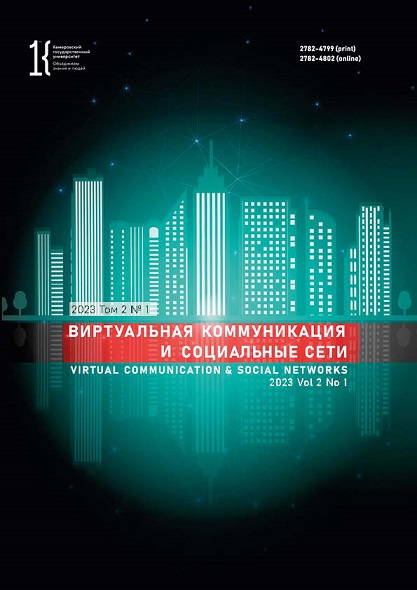Kemerovo, Russian Federation
Kemerovo, Russian Federation
The article features the image of the President of the Russian Federation in current political Internet jokes and the way his image is compared with other political and public figures. Internet joke is a hybrid genre of modern communication; it can be political, virtual, mundane, etc. The study involved general scientific methods of analysis, synthesis, and interpretation, as well as special linguistic methods of discourse and content analyses. The most frequent characters in jokes about V. V. Putin appeared to be D. A. Medvedev, D. S. Peskov, R. A. Kadyrov, D. Biden, B. Obama, D. Trump, etc. The image of V. V. Putin is dominated by his influence, authority, strength, and leadership in the Russian and international political arena. By comparing V. V. Putin with other political figures, jokes ironically reduce his image or that of his political associates and opponents. They also represent popular ideas about the unique character of presidential status in Russia.
Internet joke, political communication, humorous discourse, virtual discourse, V. V. Putin, image of a politician
1. Golev N. D. Common linguistic politology: problems and prospects. Modern political linguistics: Proc. Intern. Sci. Conf., Ekaterinburg, 29 Sep - 6 Oct 2011. Ekaterinburg: USPU, 2011, 66-69. (In Russ.) EDN: https://elibrary.ru/RXJWDZ
2. Golev N. D. Russian anecdote as a game text: internal form and content. Human - communication - text, ed. Chuvakin A. A. Barnaul: AltSU, 2000, iss. 4, 50-62. (In Russ.) EDN: https://elibrary.ru/RNXSXP
3. Erofeev Yu. V. Internet-joke as a special kind of humorous discourse. Izvestiya Samarskogo nauchnogo tsentra Rossiyskoy akademii nauk, 2010, 12(3-1): 163-166. (In Russ.) EDN: https://elibrary.ru/MGVJVF
4. Zabrodkina E. D., Pasynkova V. V. "Hard to be a God": the evolution of political images of Vladimir Putin. Administrative consulting, 2016, (2): 43-50. (In Russ.) EDN: https://elibrary.ru/VPNINJ
5. Kalashnikova A. L. "You are the Murderer!" The semantic function of precedent phenomena in the interpretation of a political communicative event in modern network anecdotes. Current Issues in Philology and Pedagogical Linguistics, 2021, (4): 163-173. (In Russ.) https://doi.org/10.29025/2079-6021-2021-4-163-173
6. Karpylatova I. V. Putin-Medvedev tandem as a phenomenon of contemporary Russian politics. APRIORI. Seriya: Gumanitarnye nauki, 2015, (4). (In Russ.) URL: https://cyberleninka.ru/article/n/tandem-putin-medvedev-kak-fenomen-sovremennoy-rossiyskoy-politiki (accessed 15 Jan 2023). EDN: https://elibrary.ru/TZPYJH
7. Kondrateva O. N., Kalashnikova A. L. Metaphorical interpretation of the 2018 presidential election in the Russian Federation in humorous political communication (on the material of anecdotes). Political Linguistics, 2021, (2): 89-97. (In Russ.) https://doi.org/10.26170/1999-2629_2021_02_08
8. Selezneva A. V. The image of V. V. Putin in the consciousness of Russian citizens. Russkaya politologiya - Russian Political Science, 2018, (2): 4-11. (In Russ.) EDN: https://elibrary.ru/YNJPOP
9. Semenova T. V. Social psychology of comic: social cognition, competent communication, emotional regulation, personal self-development, theoretical and empirical research. 2nd ed. Samara: PSASSH, 2014, 384. (In Russ.) EDN: https://elibrary.ru/TLBRAV
10. Tarasenko T. V. Linguistic aspects of the joke. Linguistic yearbook of Siberia, ed. Grigorieva T. M. Krasnoyarsk: KrasSU, 2005, iss. 7, 114-123. (In Russ.) EDN: https://elibrary.ru/UCSJMN
11. Turkov E. A. Image of Vladimir Putin: political and psychological analysis. Russkaya politologiya - Russian Political Science, 2020, (1): 120-125. (In Russ.) EDN: https://elibrary.ru/XDRVSU
12. Chudinov A. P. Discourse characteristics of political communication. Political Linguistics, 2012, (2): 53-59. (In Russ.) EDN: https://elibrary.ru/PCAVQP
13. Shestopal E. B. Swings in perception of Russian political leaders after presidential elections of 2012. Vestnik Tomskogo gosudarstvennogo universiteta. Filosofiya. Sotsiologiya. Politologiya, 2013, (3): 7-13. (In Russ.) EDN: https://elibrary.ru/RAEVAR















